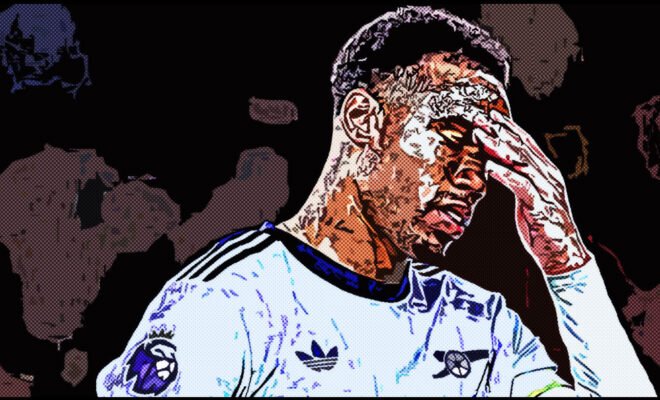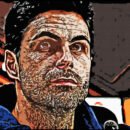Arteta and Arsenal’s Annus Horribilis: A Season of Injuries, Red Cards, and Setbacks

The full-time whistle at the City Ground wasn’t just the end of a frustrating 0-0 draw with Nottingham Forest—it felt like the moment Arsenal’s title challenge finally slipped away. The frustration among fans was instant. How did it come to this?
The anger is understandable. There will be post-mortems, finger-pointing, and demands for drastic change. Some will insist Arteta has reached his ceiling. Others will blame the club’s refusal to buy a striker. Many will rewrite history to suit their frustrations.
But take a step back.
This has not been a season of failure. It has been a season where almost everything that could go wrong, did go wrong—yet Arsenal are still standing. It has been a season where they have fought through crisis after crisis, when so many other teams would have crumbled.
This is not the end of their progress. The project hasn’t stalled. The foundation is still strong. But to understand why this season unraveled, we must push back against the myths and examine the reality.
Injuries: The True Killer of Arsenal’s Season
Injuries happen to every team, but Arsenal’s situation has been beyond normal. It has been relentless, disruptive, and in many ways, crippling.
For months, Arsenal have had to function without key attacking players, and no matter how good a team is, you cannot repeatedly rip out its core and expect the same results.
The Key Players Arsenal Have Lost
-
Martin Ødegaard – The captain. The heartbeat. The team’s creative fulcrum. His three-month absence due to an ankle injury stripped Arsenal of control in midfield, leaving them without their tempo-setter and final-third connector.
-
Bukayo Saka – The team’s most dangerous attacker, sidelined for two months with a hamstring injury after being overworked. Without him, the right side has become passive, the attack predictable, and the team lost its best source of invention.
-
Gabriel Martinelli – One of the most explosive wingers in the league. His ability to stretch defenses and run in behind is at times irreplaceable, yet Arsenal have had to survive long stretches without it.
-
Gabriel Jesus – He may not be a prolific goal scorer, but his movement, pressing, and ability to drag defenders out of position make Arsenal’s attack function. His ACL rupture in January forced Arsenal to abandon large parts of their tactical play.
-
Kai Havertz – A divisive figure, but just as he was finding his feet, a freak hamstring injury in Dubai took him out of the equation.
-
Ben White – His knee issues forced defensive reshuffles that initially disrupted Arsenal’s stability.
Arsenal are without their entire preferred front four, their captain and heartbeat of the team was out for significant time and one of their key defenders has been out for 3+ months. It is impossible to maintain title-winning form when so much of your first team is missing.
The Transfer Market: A Calculated Gamble That Didn’t Pay Off
The biggest criticism thrown at Arsenal is that they should have signed a striker. But the truth is there was no obvious solution available.
Why Arsenal Didn’t Panic Buy a No. 9
Arsenal’s primary striker target has always been Benjamin Šeško, but Leipzig made it clear they wouldn’t sell mid-season.
The alternative? Overpaying for a short-term solution. Arsenal could have thrown money at Ivan Toney, but his valuation was excessive for a player who wouldn’t have transformed the attack. They could have signed an aging striker as a stopgap, but that would have compromised the club’s long-term vision.
Arsenal bet on continuity. They trusted their squad to navigate the season. It didn’t work, but it wasn’t reckless—it was a decision made with conviction.
Departures: The Players Arsenal Let Go
Some are now suggesting Arsenal should have kept Reiss Nelson, Emile Smith Rowe, and Eddie Nketiah. But let’s be honest—at the time, their exits made sense.
- Reiss Nelson is injured again. Would keeping him have helped? No.
- Eddie Nketiah hasn’t broken through at Palace. He wanted a bigger role, but has he justified one? No.
- Smith Rowe has performed well but has still had fitness setbacks.
With a fully fit squad, these exits wouldn’t even be a discussion. Hindsight always makes things look obvious.
The Raheem Sterling Gamble: Why It Happened
Some argue that Raheem Sterling should never have been signed. That it was a desperate move. That it was a waste of resources.
But let’s revisit why it happened.
At the time, Saka was being run into the ground. Arsenal needed an experienced backup who could play across the front line, and when an opportunity to sign Sterling presented itself, they took it.
It hasn’t worked. That happens in football. But it wasn’t a mindless transfer—it was a logical move that didn’t pay off.
Red Cards: The Hidden Factor in Arsenal’s Struggles
Beyond injuries, there is another issue that has quietly cost Arsenal points: discipline.
This season, Arsenal have received five red cards—the most in the league.
The Five Red Cards That Cost Arsenal
- Declan Rice vs. Brighton (49’) – Arsenal were leading 1-0. They ended up drawing 1-1.
- Leandro Trossard vs. Man City (45+8’) – Arsenal fought for a 2-2 draw but could have won.
- William Saliba vs. Bournemouth (30’) – Sent off early, Arsenal lost 2-0.
- Myles Lewis-Skelly vs. Wolves (43’) – Arsenal held on for a 0-0 draw.
- Myles Lewis-Skelly vs. West Ham (73’) – Arsenal, chasing a winner, ended up losing 1-0.
According to The Athletic, these red cards have cost Arsenal at least four points. In a title race, that’s a significant margin.
This isn’t bad luck—it’s something that needs to be fixed.
What Happens Next?
Despite everything, Arsenal are not falling apart. They are not in crisis. This season has been a setback, but not a step backward.
The Key Priorities Moving Forward
- Saka and Martinelli, returning to full strength – Arsenal will look completely different when their best players are fully fit again.
- A summer push for Šeško – The No. 9 Arsenal have been waiting for.
- Squad depth improvements – Arsenal will hopefully have learned a painful lesson about rotation.
This is not the end of the project. This is just another test of its resilience.
Final Thoughts: A Moment to Endure, Not a Moment to Overreact
Football has a short memory. It doesn’t care about bad luck. It doesn’t care about injuries. It only remembers winners.
That’s why it’s easy to overreact.
But if you step back, you’ll see it clearly: Arsenal are still in the right place. They have built a squad that will compete for years. They are learning lessons that will make them stronger.
Yes, this season has been painful. Yes, the title dream is most likely gone.
But this team is not finished.
They are still rising.
And when their moment comes, they’ll be ready.

